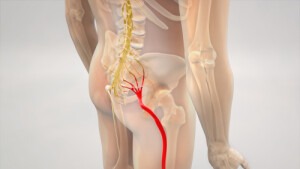Sciatica Pain
 Experts recommend treating sciatica as quickly as possible to prevent further progression of symptoms. Sciatica treatment may involve both surgical and noninvasive methods. Typically, noninvasive methods are employed before going in for a surgery. Your doctor may recommend a surgery only when the underlying cause is progressive or results in severe neurological deficit.
Experts recommend treating sciatica as quickly as possible to prevent further progression of symptoms. Sciatica treatment may involve both surgical and noninvasive methods. Typically, noninvasive methods are employed before going in for a surgery. Your doctor may recommend a surgery only when the underlying cause is progressive or results in severe neurological deficit.
Board certified orthopedic surgeon Dr. Tigran Garabekyan provides hip surgery to patients in Los Angeles, Century City, CA, and surrounding locations.
Noninvasive Treatment for Sciatica
Typically, a combination of medications, physical therapy, alternative therapies, and therapeutic injections is used as the first line of sciatica treatment. Acute sciatica doesn’t take more than 4 – 6 weeks to get better with noninvasive treatment. Chronic sciatica that involves pain for over 8 weeks may require a longer treatment time.
Sciatica Physical Therapy
A combination of stretching, strengthening, and aerobic conditioning is employed as a central component of sciatica physical therapy. The physical therapy program may also involve therapeutic exercises.
Sciatica Pain Medications
Both over-the-counter (OTC) and prescription medications are used for relieving sciatica pain. These are a few medications generally prescribed for pain management:
- Anticonvulsant medications, such as gabapentin
- Nonsteroidal anti-inflammatory drugs (NSAIDS), such as ibuprofen or naproxen
- Tricyclic antidepressants, such as amitriptyline
- Oral steroids, such as prednisone
- Opioid analgesics, such as tramadol or oxycodone
Sciatica Lumbar Therapeutic Injections
Pain from sciatica and its symptoms may be managed with lumbar therapeutic injections. Injections are used in this to provide pain relief and allow the patients to benefit and participate fully in a physical therapy program. Injections play an integral role in diagnosing the pain source and identifying target nerves.
Epidural steroid injection is the most common type of sciatica injections used for pain relief.
Microdiscectomy
This is a common surgical procedure used for treating sciatica caused by lumbar disc herniation. A very small part of the disc material protruding under the bone or nerve root is removed in this surgery. This is an open surgery, but it employs minimally invasive techniques. It can be performed with minimal tissue damage and a relatively small incision.
Lumbar Decompression Surgeries
Nerve root compression or irritation can be relieved by a wide variety of surgical approaches. Few of them are:
Laminectomy
All or part of the lamina is taken out in this procedure for providing more room to the spinal nerves. This surgery is usually performed for sciatica caused due to lumbar spinal stenosis. 75 to 90% patients experience pain relief after getting this procedure performed.
Foraminotomy
The neuroforamen in this procedure is enlarged by removing overgrowth in the bone. This results in more room for the nerve roots.
Facetectomy
Compression or pinched nerves are relieved in this surgical procedure that may be the result of degenerated facet joints. The facet joints are undercut, trimmed, and removed for relieving nerve pressure. An estimated 85% patients are expected to experience pain relief following this surgery.
A specialist in orthopedic surgery of the hip, Dr. Garabekyan receives patients from Los Angeles, Century City, CA, and nearby areas for safe and proven hip procedures.
Contact the Southern California Hip Institute
Dr. Tigran Garabekyan is a board certified orthopedic surgeon specializing in hip preservation. To learn more about Southern California Hip Institute or to schedule a consultation, click here to contact us or call:
Century City / Los Angeles: 310.595.1030
Serving patients in Los Angeles, Beverly Hills, Santa Monica, Century City, West Hollywood, North Hollywood Encino, Sherman Oaks, Van Nuys, Burbank, Glendale and other neighboring cities in the greater Los Angeles, California area.
Also visit http://www.drgorthopedics.com/





